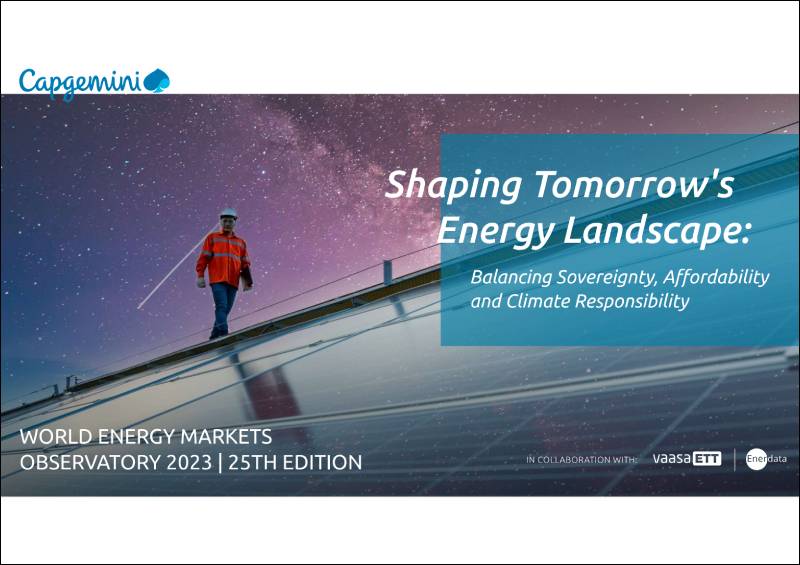Climate Change Effects Happening Far Quicker Than Expected: WEMO Report

Capgemini, the leading IT services and consulting major, has published the 25th edition of its annual World Energy Markets Observatory (WEMO), created in partnership with Vaasa ETT and Enerdata. The report takes stock of the current state of the energy transition, revealing that, despite progress being made, greenhouse gas (GHG) emissions are continuing to increase, and climate change consequences are happening far quicker than expected. The report also provides insights on what the key focus areas would need to be moving forward to ensure a successful energy transition, including a change in public perception as well as sustained and realistic regulations.
The report observes that the global renewable capacity needs to triple. While $1.3 trillion of energy transition investments in 2022 was a record (significantly outpacing spending on fossil fuels), it needs to accelerate to $5 trillion per annum to align with a net zero emissions pathway. In 2022, renewables capacity additions set a record with an annual addition of 340 GW and 2023 should be another record year. However, this growth is far below what is needed to achieve net zero carbon in 2050 as global renewable capacity should grow by 2,400 GW over the 2022-2027 period (i.e. an annual average growth of 480 GW). Solar Photovoltaic (PV) broke a record for annual capacity additions in 2022 and looks set for another record year in 2023. Wind addition decreased by 19 per cent globally with offshore wind development encountering difficulties in Europe and the US.
It also observes that global electricity consumption will have to quadruple by 2050 to hit decarbonization objectives, with over 75 per cent of it supplied by wind and solar. Renewable electricity capacity additions are driving the shift in electricity supply. However, the current growth is far below what is needed and must triple to meet 2050 targets. Linked to this growing electrification is the need to expand electrical grids. These need to grow from 75 million km to 200 million km and become smarter with more stationary storage, sensors and intelligent exploitation of large masses of data.
Reaching decarbonization goals will not happen without nuclear energy and so it is imperative there is a focus on extending its capacity. Nuclear capacity will have to triple by 2050 to achieve net zero carbon. This means reaching 870 GW capacity by 2050 from 390 GW today. Achieving this will require not only the development of large reactors and SMRs (Small Modular Reactors) but also a commitment to extending safely the life of current reactors.
According to Colette Lewiner, Energy and Utilities Senior Advisor at Capgemini: “Despite progress, the world is not on the right climate trajectory. Even though investments in renewable energy in 2022 reached an unprecedented high, an acceleration of clean technologies will be critical, not only to enabling a shift away from fossil fuels but also to ensuring energy security of supply. What is needed to make sure the five big green energy technologies – wind, solar, nuclear, batteries and hydrogen – can meet their 2050 targets is by no means a small effort. The main obstacles are linked to financing and to the difficulty of adapting our economy quickly. Each investment decision should be taken regarding its impact on sustainability and energy sovereignty as well as affordability for citizens.”
While making key recommendations, the report says that the ever-evolving geopolitical disruption reinforces the need for a transition to in-country renewable energy sources and for governments to introduce supportive policies. Accelerating the pace of moving to renewables makes countries more energy independent and helps to mitigate one of the major risks to energy supply. The energy transition proves not only to be of environmental benefit to governments, but it also helps them to safeguard their supply against threats that geopolitical unrest can cause.
The key to pushing forward with the energy transition will be shifting the perception that the lifestyle choices needed for net-zero are inaccessible to the majority due to financial reasons, or the rationale that the impact of one person is not going to make a difference. For individuals that are able, having them strive towards implementing energy efficiency lifestyle changes is going to be crucial going forward.














